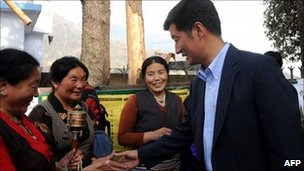source: http://www.bbc.co.uk/news/world-asia-pacific-1320548127 April 2011 Last updated at 07:03 GMT
Lobsang Sangay elected Tibetan exile leader  Lobsang Sangay is an Indian-born legal expert who has spent years as a Harvard University academicA Harvard University academic has been elected prime minister of the Tibetan government-in-exile and will take on the political role previously played by the Dalai Lama.
Lobsang Sangay is an Indian-born legal expert who has spent years as a Harvard University academicA Harvard University academic has been elected prime minister of the Tibetan government-in-exile and will take on the political role previously played by the Dalai Lama. Lobsang Sangay won 55% of the votes cast by Tibetans around the world.
He defeated two candidates for the role, Tenzin Tethong and Tashi Wangdi.
Mr Sangay must now assume the political functions of the Dalai Lama, who said in March he wanted to devolve this responsibility to an elected official.
The Dalai Lama will retain his role as Tibetan spiritual leader.
'Middle way' The elections were held in March and the result announced on Wednesday in Dharamsala, India, where the Tibetan government-in-exile is based.
"The Election Commission of the Central Tibetan Administration of His Holiness the Dalai Lama has declared Dr Lobsang Sangay as the third kalon tripa," Election Commissioner Jampal Thosang announced, using the Tibetan term for prime minister.
Almost 83,400 Tibetan exiles were eligible to vote and more than 49,000 ballots were cast, he said.
Tenzin Tethong, a former representative of the Dalai Lama in the US, got 37.4% of the vote and Tashi Wangdi, a government-in-exile bureaucrat, received 6.4%.
The 42-year-old winner is an Indian-born legal expert who has never lived in Tibet. His father fled Tibet in 1959, the same year as the Dalai Lama.
He says he will move to Dharamsala to serve as prime minister and that he supports the Dalai Lama's stance on ties with China.
"What His Holiness stands for is the 'Middle Way', which is genuine autonomy within China or within the framework of the Chinese constitution," he told the BBC earlier this month.
"If Tibetans are granted genuine autonomy then his Holiness the Dalai Lama said he is willing to accept Tibet as part of China."
Daunting task An official told Reuters news agency that that Dalai Lama was "very happy" that people "took a very active part in the election process".
The 76-year-old monk announced in March that he wanted an elected official to assume some of his responsibilities, saying that such a move was in the best interests of the Tibetan people.
Analysts say he aims to ensure that even if China's government tries to select the next Dalai Lama, the Tibetans will have an elected leader they can look to who is outside China and beyond the Communist Party's control.
The BBC's Mark Dummett says Lobsang Sangay has the daunting task of trying to keep the issue of Tibet alive while the man who embodies the struggle for Tibetan rights gradually steps back from the limelight.
He has been elected head of a government which no country recognises and will face in China an opponent which has shown no sign of wanting to compromise, our correspondent adds.